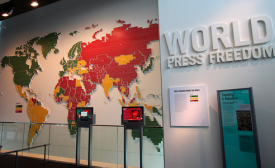press freedom
Last month, Russian President Vladimir Putin dismissed the internet as a CIA project. During a speech at a media forum in St. Petersburg, he said Russia would have to "fight for its interests" online. New laws passed in the last few days show just how serious he was.
Last Saturday, May 3, was annual World Press Freedom Day. This year, the state of press freedom is especially grim; journalists face imprisonment, kidnapping, and death for doing their jobs. “Unfortunately, we really don’t have a lot to celebrate,” said Joel Simon, executive director of the Committee to Protect Journalists.
A generation ago, Canada was perceived to be an exemplary global citizen by the rest of the world: it took the lead on a host of international issues, including the Convention of Child Rights, freedom of information, acid rain, world peacekeeping, sanctions against South Africa's apartheid regime, and humanitarian and development assistance—much of this under conservative leadership.
Press freedom in Jordan regressed last year, particularly after changes to the country’s publications and press law and government moves to block hundreds of online media sites, a new report has revealed.
If you’re reading this, you probably live in a country where the Internet provides a portal for the free exchange of ideas. But in many countries, believe it or not, what so many of us take for granted is unfathomable. In others, it is a smoldering memory.
As tensions spiral between Russia and the West over the crisis in Ukraine, the Obama administration is denouncing Moscow's imposition of new restrictions on independent Russian media. The State Department on Friday said it was "deeply troubled" by dramatic new curbs on press freedom that it said make it easier for the government to spread "patently false" information.
Among the principal assets of U.S. public diplomacy are American values. They are admired around the world, even by many people who dislike American policy. No other political system offers such extensive individual and systemic freedoms as those enumerated in the Bill of Rights. Showcasing and standing up for those freedoms should be at the heart of U.S. public diplomacy.

Among the principal assets of U.S. public diplomacy are American values. They are admired around the world, even by many people who dislike American policy. No other political system offers such extensive individual and systemic freedoms as those enumerated in the Bill of Rights. Showcasing and standing up for those freedoms should be at the heart of U.S. public diplomacy.







